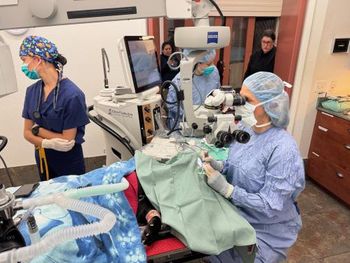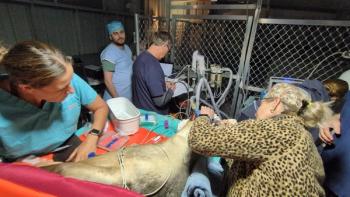
Gene discovery could lead to better understanding of how retinal cells regenerate
National Report - Veterinarians and medical researchers at the University of Pennsylvania and Cornell University have identified a gene that causes a blindness-inducing disease in dogs.
NATIONAL REPORT — Veterinarians and medical researchers at the University of Pennsylvania and Cornell University have identified a gene that causes a blindness-inducing disease in dogs.
The discovery may help scientists learn new information about how retinal cells can be regenerated.
Drs. Gustavo D. Aguirre, William A. Beltran, Agnes I. Berta and Sem Genini of Penn's School of Veterinary Medicine, and Kathleen Boesze-Battaglia of the Penn School of Dental Medicine collaborated on the study with researchers from Cornell, the National Eye Institute and the Semmelweis University of Medicine in Hungary. The study was published in the online journal PLOS One.
Aguirre began studying rod dysplasia at Penn Vet in the late 1960s. The disease causes blindness in the Norwegian Elkhound. This discovery led Aguirre and his colleagues to look for other breeds suffering from the same condition. A similar, but different, disease was discovered called early retinal degeneration (ERD) that resulted in blindness in a shorter period of time. Affected dogs became blind within a year of birth, instead of between two and four years. Researchers began to list genes that could be responsible for ERD, but it was only recently that they made a discovery in an unlikely place in the dog's genome.
"After developing the dog genetic map in the late 1990s and then mapping the disease to a known region of the genome ... we had to prioritize gene candidates by their locations and their functions," Aguirre explains. "This gene was at the bottom of our list because it's normally only found in the brain and was not related to any known vision defect. But, lo and behold, it's actually a very important gene to the retina."
Identifying the gene is a first step to explaining the progression of ERD. Microscopic analyses of retinas from afflicted dogs showed that vision-related cells die at an accelerated rate during this period, but are replaced just as quickly. The cell death and compensatory formation of new ones is a totally unexpected finding in diseases of the retina.
Although the exact function of the gene has not been identified, it is believed to be involved in the control of the cell-division cycle. Normally, photoreceptor cells in the retina stop dividing shortly after birth. These hybrid photoreceptors, however, continue to divide during ERD's plateau period. Understanding what keeps those cells dividing may hold the key for therapies that can hold off the onset of blindness, or even reverse it, Penn says.
"These cells are abnormal," Aguirre explains. "Normally, there is no good evidence of large amounts of new cells being created in the retina or the central nervous system. We can better understand the way that the photoreceptor cells divide by studying this disease and potentially manipulate the gene in such a way that you could get the division component without the abnormal component."
The research was funded by the National Eye Institute, the National Institutes of Health, a Fulbright Educational Exchange Program Fellowship, the Foundation Fighting Blindness Center, the Van Sloun Fund for Canine Genetic Research, Hope for Vision, The ONCE International Prize for R&D in Biomedicine and New Technologies for the Blind.
Newsletter
From exam room tips to practice management insights, get trusted veterinary news delivered straight to your inbox—subscribe to dvm360.




